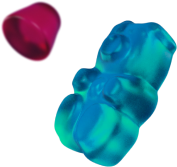Happy Gut, Happy Hormones

The gastrointestinal tract, despite being located in a single area of your body, affects numerous other systems, including digestion, nutrient absorption, mood, brain health, and even your immune system.
Additionally, there's a complex interaction between the gut and hormonal balance. The microbiome, which resides in the gut and primarily aids in digestion, also plays a significant role in influencing hormones.
Symptoms of poor gut health:
- Constipation
- Heartburn
- Gas
- Cramps
- Diarrhoea
- Reflux
Digestive problems may not always manifest, as microbial imbalances can lead to symptoms in various parts of the body. These symptoms can include:
- Mood swings
- Sugar cravings
- Headaches
- Fatigue
- Joint pain
Gut brain
The gut and brain communicate through serotonin, a neurotransmitter known for its role in mood, appetite, and sleep regulation. Certain types of gut microbes can directly stimulate the production and release of serotonin in the cells lining the colon.
Remarkably, these serotonin-producing cells contribute to over 90% of serotonin production in humans. It's no surprise that the microorganisms in your gut can significantly impact the brain and consequently affect mood. If your gut isn't functioning properly, it could lead to insufficient production of serotonin, affecting mood balance.
Brain gut
The gut-brain connection is a two-way communication system between your gut and your brain. It comprises a sophisticated network of nerve cells, chemicals, and microbes. This connection explains why your body produces stomach juices when you think about food or why you may experience stomach cramps when stressed.
Linking your central nervous system (CNS), which includes your brain, with the enteric nervous system (ENS) in your gut, this connection is often referred to as the “second brain.” The ENS not only influences your digestive health but also plays a significant role in your mental well-being.
Ways to enhance your gut-brain connection:
Diet
Diet plays a crucial role in shaping the composition of the gut microbiome. Fibre is particularly essential for the health of gut microbes as it provides them with the nutrients they need to thrive. Conversely, limiting processed foods and sugars can deter the growth of less beneficial or potentially harmful bacteria.
A few groups of foods are specifically beneficial for the gut-brain connection:
Omega-3 fats: Mackerel, salmon oysters, flaxseed, chia seeds, walnuts
Fermented foods: yogurt, kefir, kimchi, sauerkraut
High-fibre foods: whole grains, nuts, seeds, fruit, vegetables
Polyphenol-rich foods: dark chocolate, cherries, green tea, olive oil, blueberries
Tryptophan-rich foods: turkey, eggs, cheese, salmon, tofu
Exercise
Regular exercise has proven to have a positive effect on the diversity of the gut microbiome. Physical activity can stimulate the increased production of short-chain fatty acids (SCFAs), which are known to contribute to the regulation of inflammation and the enhancement of gut barrier function.
Manage Stress
When feeling nervous or anxious, your body releases hormones and chemicals that impact the digestive system. This can influence the microorganisms residing in your gut, aiding in digestion while reducing antibody production. The resulting chemical imbalance can lead to various gastrointestinal conditions.
Prebiotics/Probiotics
Probiotics are beneficial bacteria, and prebiotics is food for these bacteria. Eating foods or taking supplements containing both can help balance your gut bacteria.











